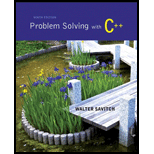
Create a C-string variable that contains a name, age, and title. Each field is separated by a space. For example, the string might contain “Bob 45 Programmer” or any other name/age/title in the same format. Assume the name, age, and title have no spaces themselves. Write a
Program plan:
- Include the necessary header files.
- Declare the namespace.
- Define the “main()” function.
- Declare the necessary variables.
- Initialize the character array.
- Use the functions “strtok()” to split the string into tokens.
- Use the function “strcpy()” to copy the source string into the destination string.
- Print the result.
Program to display name, age and title into separate variables using the function “cstring”.
Explanation of Solution
Program:
//Include the header file iostream
#include<iostream>
//Include the header file cstring
#include<cstring>
//Declare the namespace
using namespace std;
//Define the main() function
int main()
{
//Declare the necessary variables
char name[20];
char age[4];
char title[50];
//Initialize the char array
char res[] = "Bob 45 Programmer";
/*Call the function strtok() to split str into tokens and assign the result in *pch*/
char *pch = strtok(res," ");
/*Call the function strcpy to copy the value in pch into name*/
strcpy(name,pch);
/*Call the function strtok() to split str into tokens and assign the result in *pch*/
pch = strtok(NULL," ");
/*Call the function strcpy to copy the value in pch into age*/
strcpy(age,pch);
/*Call the function strtok() to split str into tokens and assign the result in *pch*/
pch = strtok(NULL," ");
/*Call the function strcpy to copy the value in pch into title*/
strcpy(title,pch);
//print the name
cout<<"Name: "<<name<<" ";
//print the age
cout<<"Age: "<<age<<" ";
//Print the title
cout<<"Title: "<<title;
//Return zero
return 0;
}
Output:
Name: Bob Age: 45 Title: Programmer
Want to see more full solutions like this?
Chapter 8 Solutions
Problem Solving with C++ plus MyProgrammingLab with Pearson eText-- Access Card Package (9th Edition)
Additional Engineering Textbook Solutions
Elementary Surveying: An Introduction To Geomatics (15th Edition)
Concepts Of Programming Languages
Starting Out With Visual Basic (8th Edition)
Java: An Introduction to Problem Solving and Programming (8th Edition)
Computer Science: An Overview (13th Edition) (What's New in Computer Science)
- Draw an ERD that will involve the entity types: Professor, Student, Department and Course. Be sure to add relationship types, key attributes, attributes and multiplicity on the ERD.arrow_forwardDraw an ERD that represents a book in a library system. Be sure to add relationship types, key attributes, attributes and multiplicity on the ERD.arrow_forward2:21 m Ο 21% AlmaNet WE ARE HIRING Experienced Freshers Salesforce Platform Developer APPLY NOW SEND YOUR CV: Email: hr.almanet@gmail.com Contact: +91 6264643660 Visit: www.almanet.in Locations: India, USA, UK, Vietnam (Remote & Hybrid Options Available)arrow_forward
- Provide a detailed explanation of the architecture on the diagramarrow_forwardhello please explain the architecture in the diagram below. thanks youarrow_forwardComplete the JavaScript function addPixels () to calculate the sum of pixelAmount and the given element's cssProperty value, and return the new "px" value. Ex: If helloElem's width is 150px, then calling addPixels (hello Elem, "width", 50) should return 150px + 50px = "200px". SHOW EXPECTED HTML JavaScript 1 function addPixels (element, cssProperty, pixelAmount) { 2 3 /* Your solution goes here *1 4 } 5 6 const helloElem = document.querySelector("# helloMessage"); 7 const newVal = addPixels (helloElem, "width", 50); 8 helloElem.style.setProperty("width", newVal); [arrow_forward
- Solve in MATLABarrow_forwardHello please look at the attached picture. I need an detailed explanation of the architecturearrow_forwardInformation Security Risk and Vulnerability Assessment 1- Which TCP/IP protocol is used to convert the IP address to the Mac address? Explain 2-What popular switch feature allows you to create communication boundaries between systems connected to the switch3- what types of vulnerability directly related to the programmer of the software?4- Who ensures the entity implements appropriate security controls to protect an asset? Please do not use AI and add refrencearrow_forward
 C++ Programming: From Problem Analysis to Program...Computer ScienceISBN:9781337102087Author:D. S. MalikPublisher:Cengage Learning
C++ Programming: From Problem Analysis to Program...Computer ScienceISBN:9781337102087Author:D. S. MalikPublisher:Cengage Learning Microsoft Visual C#Computer ScienceISBN:9781337102100Author:Joyce, Farrell.Publisher:Cengage Learning,
Microsoft Visual C#Computer ScienceISBN:9781337102100Author:Joyce, Farrell.Publisher:Cengage Learning, Programming with Microsoft Visual Basic 2017Computer ScienceISBN:9781337102124Author:Diane ZakPublisher:Cengage Learning
Programming with Microsoft Visual Basic 2017Computer ScienceISBN:9781337102124Author:Diane ZakPublisher:Cengage Learning C++ for Engineers and ScientistsComputer ScienceISBN:9781133187844Author:Bronson, Gary J.Publisher:Course Technology Ptr
C++ for Engineers and ScientistsComputer ScienceISBN:9781133187844Author:Bronson, Gary J.Publisher:Course Technology Ptr EBK JAVA PROGRAMMINGComputer ScienceISBN:9781337671385Author:FARRELLPublisher:CENGAGE LEARNING - CONSIGNMENT
EBK JAVA PROGRAMMINGComputer ScienceISBN:9781337671385Author:FARRELLPublisher:CENGAGE LEARNING - CONSIGNMENT EBK JAVA PROGRAMMINGComputer ScienceISBN:9781305480537Author:FARRELLPublisher:CENGAGE LEARNING - CONSIGNMENT
EBK JAVA PROGRAMMINGComputer ScienceISBN:9781305480537Author:FARRELLPublisher:CENGAGE LEARNING - CONSIGNMENT





